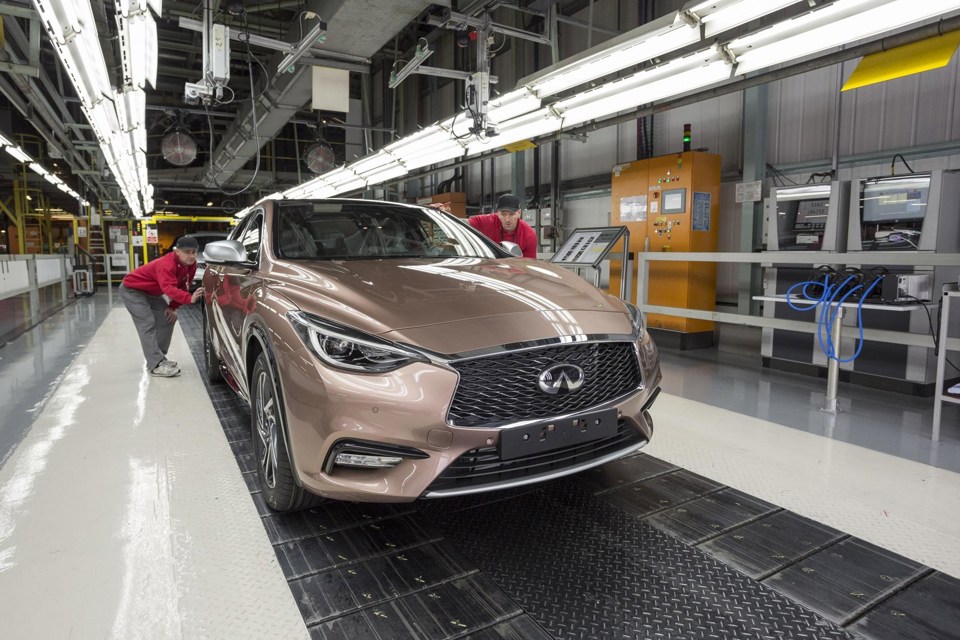The SMMT has insisted that future growth of UK automotive manufacturing is uncertain following the publication of results which showed the most productive H1 since the year 2000.
The UK car manufacturing sector finished the first half of 2016 with 158,641 units produced in June marking a 10.4% month-onmonth rise and a 897,157 total across the six-month period, up 13.0% on 2015.
It was UK car makers’ 11th consecutive month of growth, with exports driving volumes, year-to-date demand rising 14.9% to 695,139 units, while production for the domestic market also grew 7.1%.
In total, 77.8% of cars built in the UK were destined for more than 100 overseas markets.
But the SMMT was cautious about the future, stating: “The sector is part of a complex, highly-integrated European and global supply chain, and depends on significant cross border trade in components.
“While local content of UK-built cars is growing, 59% of vehicle components are imported, predominantly from the continent.
“That relationship with our biggest market is now uncertain and, as a survey of SMMT members just published shows, is of significant concern.
“57.1% of respondents believe the outcome will have a negative impact on their business, while just 8.3% foresee it being positive. A further quarter (27.7%) are uncertain about the impact at this early stage.”

The SMMT’s members survey, which received 289 responses from businesses of all sizes, found that many were concerned about the potential negative impact of tariffs, custom charges or other barriers between the UK and the EU single market (68.4%).
They also expressed concern about losing access to EU trade deals (66.4%), being bound by regulations in their prime export market over which they have no say (66.1%) and loss of access to the EU-wide skills market (63.6%).
The UK automotive manufacturing employs 169,000 people, including many skilled EU nationals, and a lack of certainty regarding the future status of these workers in the UK was cited frequently as a concern (59.7%) along with the potential for a drop in sales (52.7%) and investment (46.1%), with larger companies showing the most concern about the latter.
SMMT chief executive, Mike Hawes, said: “The latest increase in production output is the result of investment decisions made over a number of years, well before the referendum was even a prospect.
“These decisions were based on many factors but, primarily, on tariff-free access to the single market, economic stability and record levels of productivity from a highly skilled workforce. To ensure the sector’s continued growth, and with it the thousands of jobs it supports, these must be priorities in future negotiations.”
Stuart Apperley, director and head of UK automotive at Lloyds Bank Commercial Banking, said: “On the whole the UK’s automotive sector remains healthy, but the obvious challenge, of course, is the implications of the vote to leave the EU.
"The uncertainty around the UK’s future relationship with the EU could mean we see new transplant investments – as opposed to maintenance capex and fulfilment of previously earmarked investment – put on hold while the UK’s relationship with the EU is agreed, and this clearly would have potential negative consequences for the UK.”
Chris Bosworth, director of strategy at Close Brothers Motor Finance, said: “Production in the car manufacturing industry has been going up through the gears for almost a year now, as new models, more plant capacity and increased utilisation of that capacity has expanded the UK’s car making proficiency.
"A growth spurt since the end of last summer has seen year on year production volumes climb to a high of 1.75 million, but a number of factors suggest this momentum may be short lived.
“We’re yet to see the full effect of the Brexit vote, but any reduction in finance subsidies and the possible relocation of manufacturing plants would lead to production volumes falling. The UK is home to seven foreign volume car manufacturers, many drawn by both the attractive price of metal and proximity to Europe, so any disruption may see car prices climb in the showrooms.
“The Brexit decision comes at what is already something of an inflection point for the car market.
"A steady flood of new cars entering the market has built up a wave of used vehicles, and these two or three-year-old cars will soon be returning to forecourts.
"According to the FLA, used car vehicle finance grew by 15% year on year, and as consumers gravitate to well-priced ‘nearly-new’ stock, it will only exacerbate any demand side pressures on UK car manufacturers.”















Login to comment
Comments
No comments have been made yet.